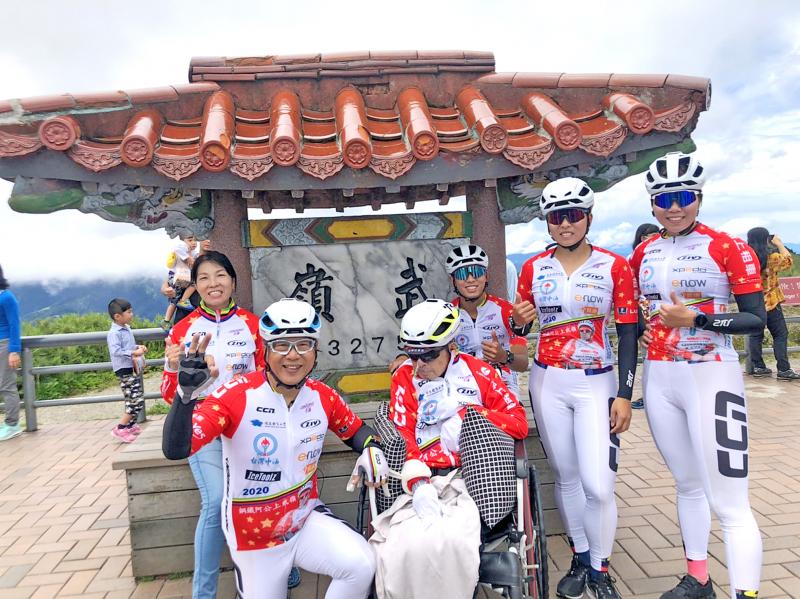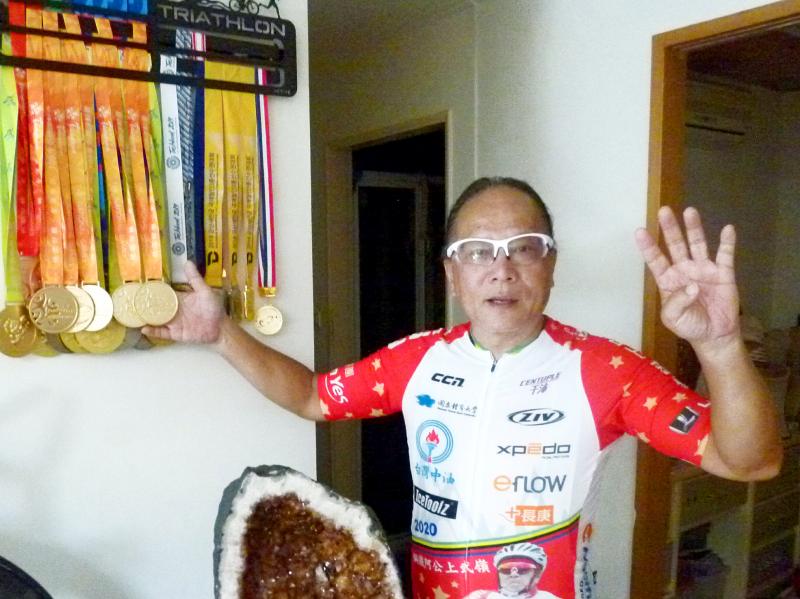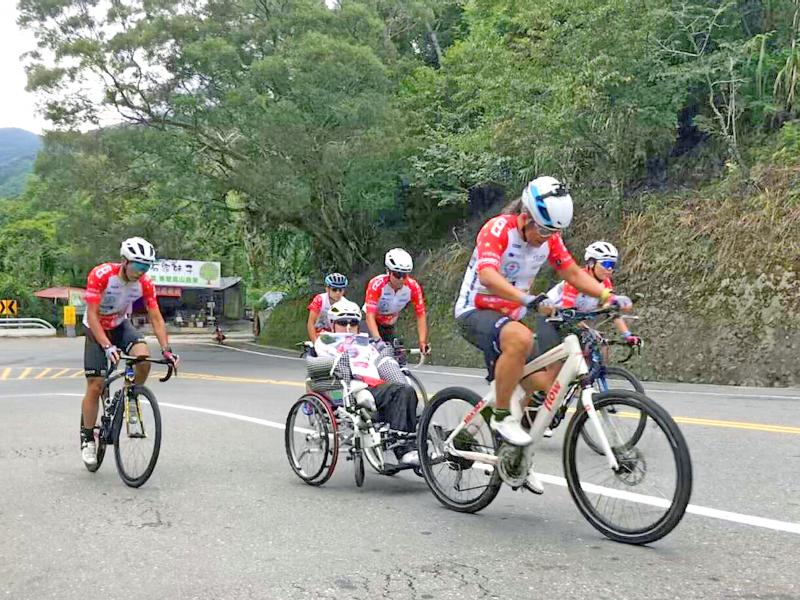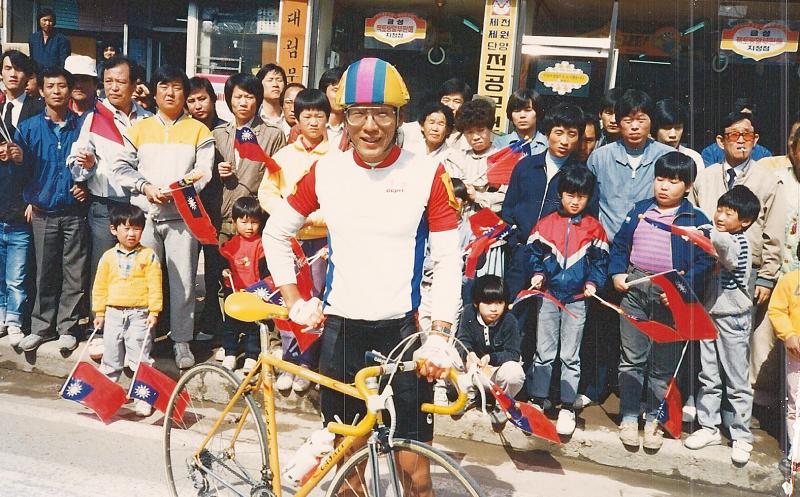Like many MAMIL (middle-aged men in Lycra), Chang Han-chang (張漢章) got into cycling in his fifties. Unlike most others, however, he caught the bug from his son, Chang Sheng-kai (張勝凱), who at age 19 had become Taiwan’s national road cycling champion.
After three years of compulsory military service, the younger Chang was champion again in 1984, went on to dominate domestic cycling throughout the 1980s, represent the Chinese Taipei team in Japan, South Korea, Costa Rica and France, and take first place in the Tour of Hong Kong in 1988. After hanging up his racing cleats in 1991, he went on to found CSK Bikes, just in time to cash in on Taiwan’s cycling craze a few years later.
Chang senior was no slouch either, becoming national champion for his age group, accompanying his son and 11-year-old grandson Chang Chia-hao (張家豪) on a 6,000km tour around eastern and northeastern China, and cycling well into his eighties. One thing still bugged him, however: He had never ridden over Wuling (武嶺) which, at 3,275 meters above sea level, is Taiwan’s highest public road.

Photo courtesy of Chang Sheng-kai
“Nowadays, along with the round-island ride, cycling up to Wuling is a kind of coming-of-age route for aspiring cyclists,” says Chang Sheng-kai. “But in Dad’s day, it just wasn’t ‘a thing.’
Chang recalls that, on his 80th birthday, his father had set himself three goals: to ride around Taiwan, to Sun Moon Lake (日月潭), and to Wuling. Unfortunately, although completing the first two, before he could attempt the last one he had a stroke, leaving him barely capable of talking, never mind walking, let alone riding a bike.
A light-weight wheelchair that could be towed behind a bicycle was therefore designed and constructed at the CSK factory in Miaoli County. Over the last two days of July this year, Chang and his three children set out from Puli (埔里), 55 kilometers to the west in Nantou County, to ascend almost 2,800 meters to the top and help “Granddad Steel” (鋼鐵阿公) realize his dream.

Photo: Mark Caltonhill
Chang took turns with his two daughters, Chia-chia (張嘉家; 25) and Ting-ting (張婷婷; 21), and son Chang Chia-hao (20) — who have won 11 National Games as well as more than 200 other gold medals between them — to ride the bike pulling the wheelchair. For the steepest parts, where the gradient reaches and occasionally exceeds 10 percent, they got off and helped to push.
ALMOST IMPOSSIBLE
“Even on the flat it wasn’t easy,” Chang says, with the bike, rider, wheelchair and passenger together weighing more than 200 kilograms. Moreover, once they reached higher altitudes where the air was thinner, it got even harder. “The last two kilometers were almost impossible. From the Kunyang (昆陽) rest stop took more than 50 minutes.”

Photo courtesy of Chang Sheng-kai
Television cameras were waiting at the top, where journalists interviewed the various Changs. The three youngsters were buoyant, and Granddad Steel was finally coaxed to say “Thank you, everyone,” which moved an exhausted-looking Sheng-kai to tears.
“Dad was initially against me cycling,” Chang says a couple of weeks later while being interviewed for this piece on a morning training ride from his home in the hills beyond Xindian (新店) southward to Wulai (烏來) and Fushan (福山) and back.
His father had bred dogs and shown them in competition, and as a young boy Chang had taken the larger ones out for exercise. That had kept him pretty healthy, and he became interested in cycling after reading about it in magazines.

Photo courtesy of Chang Sheng-kai
“I never had a coach, but after I started to win races people told Dad that I was a natural and he should support me.”
Not only did his father support him, he also took up cycling and even became age-group champion four times himself.
Chang’s home, shop and factory are adorned with photos from his racing years, which prompt him to reminisce about his glory years: his top-5 finish in the Tour of Korea, third in the Tour of Taiwan, standing on top of the podium in Hong Kong, as well as Lance Armstrong flying past him in the Time Trial World Championship in 1990. Pride of place now goes to photos of his children, however, alongside some of their 200 medals.
CYCLING EXPLOSION
In the meantime, his bike shop had “done alright,” especially after he launched his own brand of bikes in 1995, and even more so when cycling became hugely popular with the general public. Chang says he sold around 800 to 1,000 frames each year between 2000 and 2010.
The downturn in this market, which hit a great many manufacturers in Taiwan, forced some to close and others to refocus their activities from simply selling mass-produced models, similarly affected CSK Bikes. Chang’s response was also to refocus, not on niche cycles or services, however, but rather on promoting his children’s racing careers.
For their next target of winning gold medals at the 2021 National Games, he will act as agent, manager and coach. Winning a gold medal earns NT$900,000 (US$30,000), which was unprecedented in his days, but means that athletes can now make a living from their sport.
The popularity of cycling also means that bike-related businesses can support both events and athletes. This helps to explain not only the presence of media representatives at the top of the mountain on July 31, but also the plethora of sponsors’ logos on the cycling shirts worn by Chang’s children in their races and by the whole family during the two-day Wuling challenge.
But private sponsorship can only go so far, and Chang says government support is also needed. His second daughter, Ting-ting, was UCI Junior Time Trial champion in 2016 and won the Under-23 Asian Championship last year. For her to continue to improve, Chang says his knowledge is limited and thinks she must go to Europe for specialist coaching.
“If she was a table tennis player, for example, the government might pay for this, but they cannot envisage a Taiwanese being world cycling champion. Taiwan has never had a rider in a Tour de France team, and probably never will if this attitude continues.”

June 23 to June 29 After capturing the walled city of Hsinchu on June 22, 1895, the Japanese hoped to quickly push south and seize control of Taiwan’s entire west coast — but their advance was stalled for more than a month. Not only did local Hakka fighters continue to cause them headaches, resistance forces even attempted to retake the city three times. “We had planned to occupy Anping (Tainan) and Takao (Kaohsiung) as soon as possible, but ever since we took Hsinchu, nearby bandits proclaiming to be ‘righteous people’ (義民) have been destroying train tracks and electrical cables, and gathering in villages

Swooping low over the banks of a Nile River tributary, an aid flight run by retired American military officers released a stream of food-stuffed sacks over a town emptied by fighting in South Sudan, a country wracked by conflict. Last week’s air drop was the latest in a controversial development — private contracting firms led by former US intelligence officers and military veterans delivering aid to some of the world’s deadliest conflict zones, in operations organized with governments that are combatants in the conflicts. The moves are roiling the global aid community, which warns of a more militarized, politicized and profit-seeking trend

The wide-screen spectacle of Formula One gets a gleaming, rip-roaring workout in Joseph Kosinski’s F1, a fine-tuned machine of a movie that, in its most riveting racing scenes, approaches a kind of high-speed splendor. Kosinski, who last endeavored to put moviegoers in the seat of a fighter jet in Top Gun: Maverick, has moved to the open cockpits of Formula One with much the same affection, if not outright need, for speed. A lot of the same team is back. Jerry Bruckheimer produces. Ehren Kruger, a co-writer on Maverick, takes sole credit here. Hans Zimmer, a co-composer previously, supplies the thumping

Dr. Y. Tony Yang, Associate Dean of Health Policy and Population Science at George Washington University, argued last week in a piece for the Taipei Times about former president Ma Ying-jeou (馬英九) leading a student delegation to the People’s Republic of China (PRC) that, “The real question is not whether Ma’s visit helps or hurts Taiwan — it is why Taiwan lacks a sophisticated, multi-track approach to one of the most complex geopolitical relationships in the world” (“Ma’s Visit, DPP’s Blind Spot,” June 18, page 8). Yang contends that the Democratic Progressive Party (DPP) has a blind spot: “By treating any